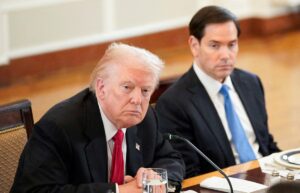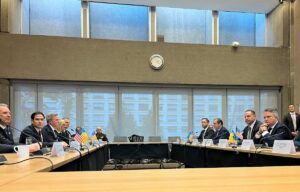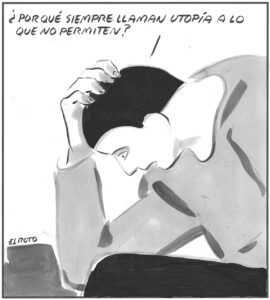
Last week, Russia attacked Ukrainian civilians with more than 500 drones, cruise missiles and rockets. Most of these drones were shot down, but the attack hit two apartment buildings in Ternopil, western Ukraine, killing at least 31 people, including six children. Houses, shops, post offices and power plants throughout Ukraine also burned as a result of this bombing.
But this war crime, the latest in Russia’s criminal war, was overshadowed by the revelation that Russian President Vladimir Putin and US President Donald Trump were secretly negotiating a deal. The 28-point plan, drawn up by American special envoy Steve Witkoff, a billionaire real estate developer and cryptocurrency magnate, and Kirill Dmitriev, head of the Russian sovereign wealth fund, would be heavily biased in favor of the Kremlin. Trump has asked Ukraine to accept this secret deal by November 27, although he also said it may not be his final offer.
In addition to the fundamental injustice of allowing the aggressor to decide the outcome of the war he started, six fundamental problems surround this “peace” plan.
For starters, it would increase the risk of nuclear war. If Ukraine is forced to accept conditions that amount to defeat, the rest of the world will conclude that nuclear weapons are necessary to deter a future invasion by Russia, China, or any other nuclear power. The forced capitulation of Ukraine entails nuclear proliferation and a significant increase in the likelihood of a nuclear World War III.
This risk reflects the second problem with Trump’s peace plan: its implications for an international order that is based on the principle that national borders are inviolable. Sure, transgressions happen, but they are the exception, not the norm. Endorsing such behavior – as Trump would by rewarding Russia for invading Ukraine – is so foolish that it would shake the system. In its current form, the Witkoff-Dmitriev pact risks creating a world in which invasions and wars become a matter of routine.
Third, adhering to the Kremlin’s long-standing demands would undermine regional peace and stability. If the terms of the agreement leave Russia in a stronger position vis-à-vis Ukraine, Putin will be encouraged in every way possible – legally, morally, psychologically and economically – to continue waging war in Europe.
Fourth, Trump’s plan does not include credible enforcement mechanisms. Given that Russia has violated every agreement it has with Ukraine, the Kremlin’s assurances that it will not seek to seize further Ukrainian territory are meaningless.
American security guarantees also lack substance, especially under an administration that cares little about honesty and fair treatment. The only significant deterrent against further Russian aggression is for Ukraine to join NATO, which the proposed agreement expressly prohibits.
By prioritizing Russia’s imperial fantasy over Ukraine’s democratic will, Trump’s plan sidesteps the issue of reconstruction, the fifth major issue. Peace is more than the temporary absence of hostility. I am sure that Russia would accept a ceasefire for days – or maybe even weeks – in exchange for Ukraine’s eventual capitulation. But true peace means ensuring that Ukraine maintains its sovereignty and can defend itself, forge alliances and, above all, rebuild. Although the proposed deal does not contemplate it, Ukraine’s allies have presented perfectly reasonable (and, indeed, profitable) plans to rebuild the country and attract foreign investment.
The final issue, and perhaps the most fundamental, is process. What we know from history is that to secure a lasting peace agreement, all stakeholders must be involved. Let us remember that, after the First World War, the countries considered aggressors were excluded from the most critical part of the peace negotiations, a decision that contributed to the outbreak of the Second World War.
In this case the Ukrainians, victims of the aggression, were not consulted in the preparation of the peace plan, which appears to have been dictated by the Russians and translated into English by the Americans. (This idea may not be as far-fetched as it sounds: It has been widely reported that Witkoff relies on a Kremlin-provided translator when negotiating with Putin.)
Even the second most important stakeholder, Ukraine’s European allies, were caught off guard by Trump’s secrecy in the negotiations. If true peace is to be achieved, which allows Ukraine to be defended and rebuilt, these parties must come to the negotiating table.
Trump’s approach won’t work. If important actors are excluded from the peace process, it is impossible to fully understand the relevant issues and gather the necessary information. By excluding Ukraine and its European allies from negotiations to reach a deal, Russia and the United States may leave the Ukrainians with no choice but to fight. Trump may think he can wash his hands of Ukraine, but the problem will not have been solved.
Trump’s desire to win a Nobel Peace Prize – one of the most notorious vulnerabilities in the history of international relations – has led to an ill-conceived attempt to reach a peace agreement that, if achieved, would virtually guarantee future conflict. As the US administration attempts to intimidate Ukraine and its allies into accepting an unjust “peace” that will never last, we must continue to demand that Ukrainians be heard, respected, and supported.





